Take her to the Moon: Inside Out (2015)
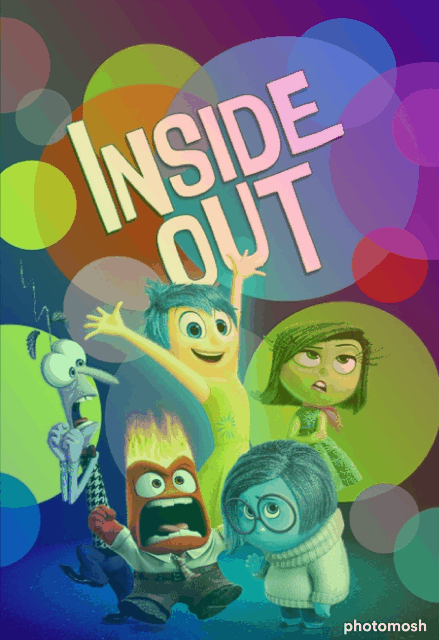

Hello, cinephiles. A few days ago I remembered this animated film and how much I loved it, and I think it would be superfluous to "present a summary" of it, as famous as it still is. Besides, a new installment is coming, with its new emotions and, for sure, a new emotional chaos. At the time I said that Inside Out was clearly not a children's movie, but rather I thought it was a message for adults or for parents to inform them about what childhood depression is. And in a way, it has some truth to it, since (in this case) a teenager knows the least about their emotions at that stage, let alone how to deal with them.

Hola, cinéfilos. Hace unos días me acordé de este film animado y lo muchísimo que me encantó, y creo que estaría de más “presentar un resumen” de ella, con lo famosa que aún es. Además de que ya viene una nueva entrega, con sus nuevas emociones y, de seguro, un nuevo caos emocional. En su momento dije que, Intensamente, claramente no era una película infantil, sino más bien pensé que se trataba de un mensaje para los adultos o para los padres a modo de informarlos sobre qué es la depresión infantil. Y en cierta forma, tiene algo de cierto, ya que (en este caso) un adolescente lo menos que sabe en esa etapa, es sobre sus emociones y mucho menos el cómo manejarlas.

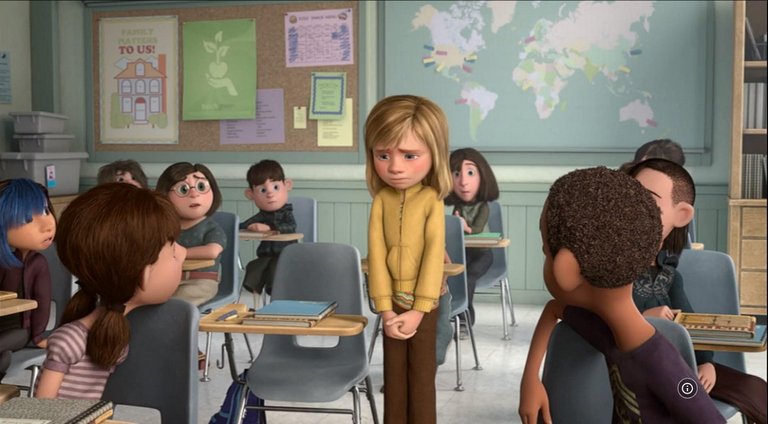

Then, in one of my many internal debates, another possibility came to my mind: it is a teaching for teenagers, as a preview to this complicated situation that may happen to them. Let's think a little and let's go to the reality in the USA (where the story takes place), most of the children and teenagers are already in some kind of therapeutic treatment, and it is well known their high rate of depression (for whatever reason) and the little adequate attention they are given. Despite the fact that many young people know about mental health, there are many cases in which they are unaware of the subject and lock themselves away because they don't know how to handle the situation, as happens in this feature film. Riley goes from having a full and happy life to living in a new environment in which she does not feel at ease at all and begins to experience all kinds of insecurities and that internal struggle to be happy remembering all those happy moments of her past. Perhaps for that reason, many people theorized and assured that Joy was the villain in the whole story, for not letting Riley process all the grief she felt.

Luego en uno de mis tantos debates internos, se me vino otra posibilidad: es una enseñanza para los adolescentes, como un previo ante esta situación tan complicada que pueda ocurrirles. Pensemos un poco y vayamos a la realidad en USA (donde se desarrolla la historia), la mayoría de los infantes y adolescentes ya están en algún tratamiento terapéutico, y es bien sabido su alta tasa de depresión (por cual sea la razón) y la poca atención adecuada que se les da. A pesar de que muchos jóvenes saben sobre salud mental, no son pocos los casos en que éstos desconocen del tema y se encierran por no saber manejar la situación, tal y como pasa en este largometraje. Riley pasa de tener una vida plena y feliz a vivir en un nuevo entorno en el que no se siente para nada a gusto y empieza a surgirle todo tipo de inseguridades y esa lucha interna por ser feliz recordando todos esos momentos alegres de su pasado. Quizás por eso, muchas personas teorizaban y aseguraban que Alegría era la villana en toda la historia, por no dejar a Riley procesar todo el duelo que sentía.

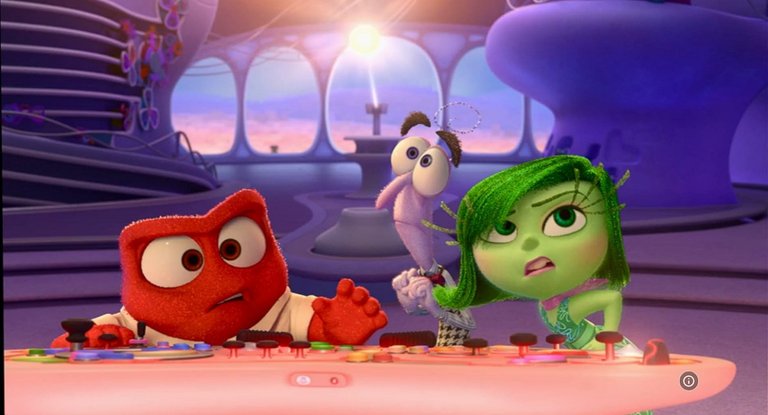

Pete Docter (screenwriter) and Bert Berry (director) perfectly exemplified the whole process of going through depression. That "black out" or mind on automatic in Riley's life and environment, as the gradual breakdown of the islands (that would come to feel her values, principles and experiences) and the chaos that was in her mind. Although each personification of emotions had a specific role, they were unable to bring a "normal" Riley back into action, and it is just those emotions that were "in charge" for a moment (Anger, Disgust and Fear) before the epic "black out" I told you about above; all of this is actually the result of depression. This doesn't just happen to Riley, this is what really goes on in people's minds. The production team was really spot on with this whole process, and was able to explain it in such a simple way that parents and kids alike could understand right away and know that none of this is wrong, nor is it deserving of any blame. In this case, Riley has spectacular parents who, despite knowing her, having all the confidence in the world and loving her, did not know this new facet of their daughter and do not know how to act, more than worried.

Pete Docter (guionista) y Bert Berry (director) ejemplificaron perfectamente todo el proceso por el que se pasa a la depresión. Ese “black out” o mente en automático en la vida y el entorno de Riley, como el rompimiento paulatino de las islas (que vendrían siento sus valores, principios y experiencias) y el caos que había en su en su mente. A pesar de que cada personificación de las emociones tenía un rol especifico, eran incapaces de volver a poner en acción a una Riley “normal”, y son justas esas emociones las que “quedaron al mando” por un momento (Ira, Desagrado y Temor) antes del épico “black out” del que les hablé arriba; todo esto en realidad es el resultado de la depresión. Esto no solo le pasa a Riley, esto es lo que realmente ocurre en la mente de las personas. El equipo de producción fue realmente muy acertado con todo este proceso, y lo pudo explicar de una forma tan sencilla que, tanto padres y jóvenes, pudieran entender a la primera y saber que nada de esto está mal, ni es meritorio de alguna culpa. En este caso, Riley cuenta con unos padres espectaculares que, a pesar de conocerla, tener toda la confianza del mundo y quererla, no conocían esta nueva faceta de su hija y tampoco saben cómo actuar, más que preocupadamente.

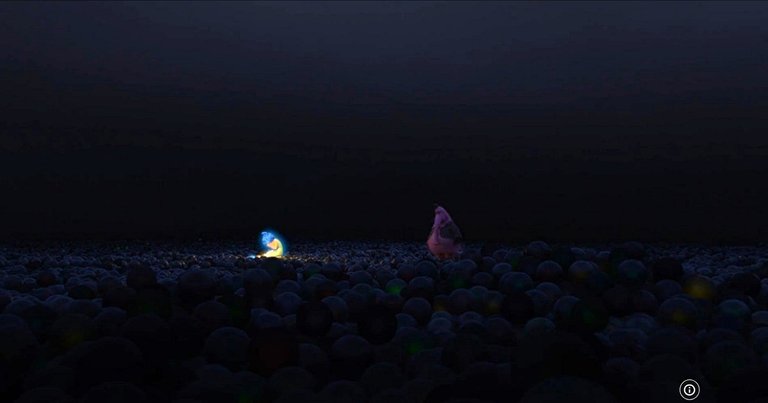

If it is true that during the film we are going to find many parts in which we will laugh, because it does not stop being an animated film, but it also has many strong scenes (or at least for me they were) that make us cry not because of what happens, but because we understand what happens precisely and, consciously, many did not know it. In addition to all this, we have at the same time the issue of "growing up", seeing how "the staff" of the mind worked to go eliminating all the things of Riley's childhood throwing them to the "mental dustbin" (which is just the nice way to call oblivion).

Si es cierto que durante la película nos vamos a encontrar con muchas partes en las que nos reiremos, porque no deja de ser un film animado, pero cuenta también con muchas escenas fuertes (o por lo menos para mi lo fueron) que nos hacen llorar no por lo que pasa, sino porque entendemos qué es lo que ocurre precisamente y, conscientemente, muchos no lo sabíamos. Además de todo esto, tenemos al mismo tiempo el asunto del “crecer”, ver cómo “el personal” de la mente trabajaba para ir eliminando todas las cosas de la niñez de Riley lanzándolas al “basurero mental” (que no es más que la forma bonita de llamar al olvido).

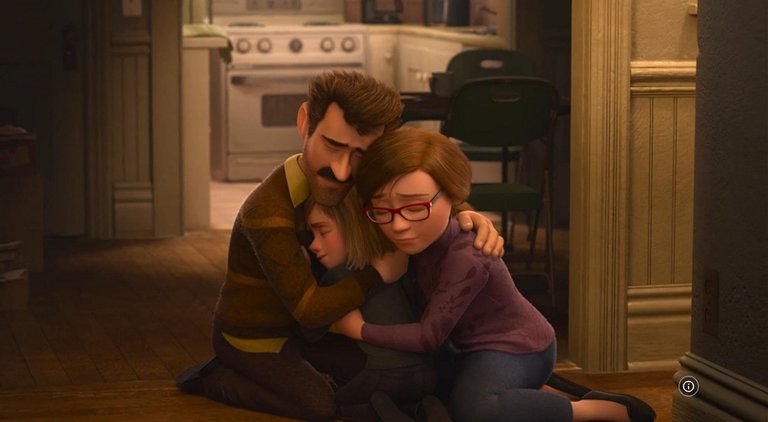

I saw this movie shortly after I started my career as a therapist, and it made me realize that, up to that time, what I knew about the mind and emotions (not to be confused with feelings) was in its infancy. It helped me a lot to understand about processes that I didn't know how they worked and to remember (thanks to Sadness) that sometimes it's okay not to feel happy and that sometimes that also helps to feel better; just as it happens at the end with Riley when she tells her parents everything. There is no doubt that this is a film to watch as a family and talk about it (if you have children, even better) and to strengthen bonds and create a support system for those moments when Sadness takes over at "headquarters". So, as I always say, "If you haven't seen it, see it, and if you have seen it, see it again, you can't miss anything."

Esta película la vi a poco tiempo de empezar mi carrera como terapeuta, y me hizo entender que, hasta esa fecha, lo que sabía de la mente y las emociones (no confundir con sentimientos) estaba en pañales. Me ayudó muchísimo a entender sobre procesos que no sabía cómo funcionaban y a recordar (gracias a Tristeza) que a veces está bien no sentirse feliz y que eso, a veces, también ayuda a sentirse mejor; tal y como pasa al final con Riley al contarle todo a sus padres. Sin duda alguna que este es un film para verla en familia y conversar sobre ella (en caso de tener hijos, mejor aún) y afianzar los lazos y a crear un sistema de apoyo para esos momentos en el que Tristeza tome el control en “el cuartel general”. Así que, como le digo siempre: “Si no la han viso, véanla, y si ya la vieron, vuélvanla a ver, no tiene perdida de nada.”

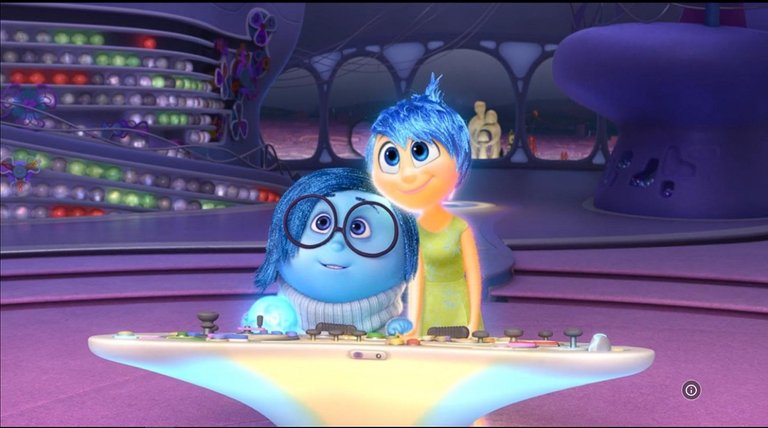

Thank you for coming here and reading me. | Gracias llegar hasta aquí y leerme.
🖤
Images taken from (Imágenes tomadas de) IMDb + GIF PhotoMosh
Posted Using InLeo Alpha
Me encantó tu reseña porque ciertamente poco sabemos de las emociones y el daño que causan los padres a los hijos "haciendo lo mejor para ellos" sin saber en realidad lo que es mejor para ellos.
Tiene mucha tela que cortar y sí, viene una segunda parte que creo que es digna de ver.
Saludos y gracias por compartirla.
Sí, casi siempre los padres actúan desde el descoocimiento. Y es normal, no hay un manual que explique a la perfección cada situación.
Que bueno que te gustó, gracias por pasarte por aquí.
Saludos!
Es una excelente película para reflexionar. Me gustó tu publicación. Tengo que volver a verla antes de que salga la segunda parte.
Claro, hay que verla y echar las respectivas lagrimitas jejeje. Que bueno que te gustó. Saludos!